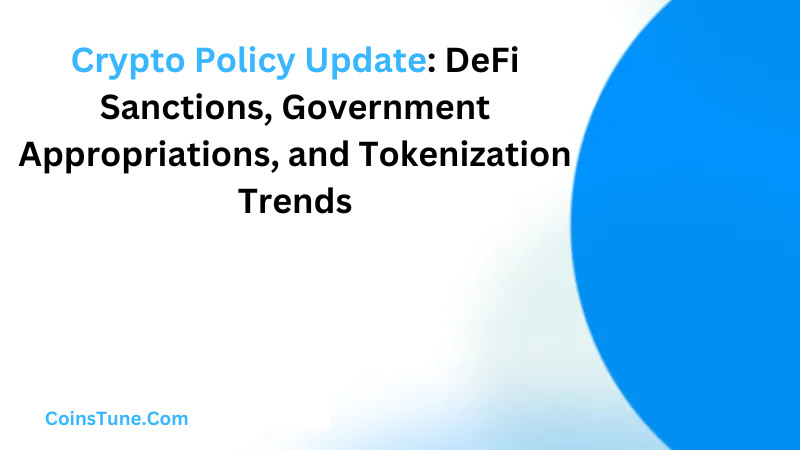Welcome back to Coinstune.com, your trusted source for all things crypto! This past week has been buzzing with significant policy developments that could shape the future of cryptocurrency. From a controversial DeFi sanctions bill to crucial government appropriations and the ever-evolving landscape of tokenization, there’s a lot to unpack. Let’s dive into the highlights and what they mean for our crypto community.
DeFi Sanctions Bill: Navigating the Regulatory Waters
One of the biggest stories this week is the introduction of a bill targeting decentralized finance (DeFi) platforms. This proposed legislation aims to impose sanctions on certain DeFi protocols to prevent illicit activities. Here’s a closer look at what’s in the bill and its potential impact.
What’s in the Bill?
The bill outlines a framework to identify and sanction DeFi protocols that do not comply with anti-money laundering (AML) and counter-terrorism financing (CTF) regulations. Developers and operators could be held accountable for ensuring their platforms are not used for illegal activities.
Implications for DeFi
The implications are significant. While the bill aims to enhance the security and credibility of the crypto ecosystem, it also raises concerns about over-regulation. Developers might face a more complex legal landscape, potentially stifling innovation and growth.
Community Reactions
The crypto community’s reaction has been mixed. Some see it as a necessary step towards legitimizing the industry and protecting investors, while others worry it could undermine the principles of decentralization and privacy. Here at Coinstune.com, we believe a balanced approach is crucial—one that safeguards security without stifling innovation.
Appropriations and Crypto: Funding the Future
In tandem with the DeFi sanctions bill, several important appropriations decisions were made this week. Governments worldwide are starting to realize the importance of blockchain technology and are allocating funds to support its development and regulation.
Key Appropriations
Here are some of the key appropriations that could impact the crypto industry:
- Increased funding for regulatory bodies like the SEC and CFTC to enhance their capabilities in monitoring and enforcing crypto-related activities.
- Investments in blockchain research and development to explore new applications and improve existing technologies.
- Grants for educational initiatives aimed at increasing public understanding of cryptocurrencies and blockchain.
Impact on the Industry
These appropriations show a commitment to integrating crypto into the broader financial system while ensuring adequate oversight. By funding regulatory bodies, governments aim to create a safer environment for investors. Investments in R&D and education underscore the transformative potential of blockchain technology.
Tokenization: The New Frontier
Tokenization remains a hot topic in the crypto world, with exciting developments this week underscoring its growing significance. Tokenization, the process of converting physical or digital assets into blockchain-based tokens, is revolutionizing various sectors.
Recent Developments
Here’s what’s been happening:
- Real estate platforms are increasingly using tokenization to offer fractional ownership, making property investment more accessible.
- Art and collectibles are also being tokenized, with high-profile auctions and sales showcasing the value of digital ownership.
- Financial institutions are exploring the tokenization of securities to improve liquidity and reduce transaction costs.
Advantages of Tokenization
Tokenization offers several key benefits:
- Increased Liquidity: Tokenized assets can be traded more easily, providing greater liquidity.
- Accessibility: Smaller investors can now participate in markets previously out of reach, such as real estate or fine art.
- Transparency and Security: Blockchain technology ensures transparent and secure transactions, reducing the risk of fraud.
Challenges Ahead
Despite its potential, tokenization faces several challenges. Regulatory uncertainty remains a significant hurdle, as existing laws are not always well-suited to handle digital assets. Technological and security issues must also be addressed to ensure the integrity of tokenized assets.
Conclusion
This past week in crypto policy has been nothing short of eventful. From new regulatory measures to crucial government appropriations and the expanding world of tokenization, the landscape of cryptocurrency is constantly evolving. Here at Coinstune.com, we’re committed to keeping you informed and engaged as we navigate these dynamic changes together.
Stay tuned for more updates and insights. As always, we welcome your thoughts and discussions on these developments. Let’s continue to explore the exciting world of cryptocurrency and blockchain technology together!









